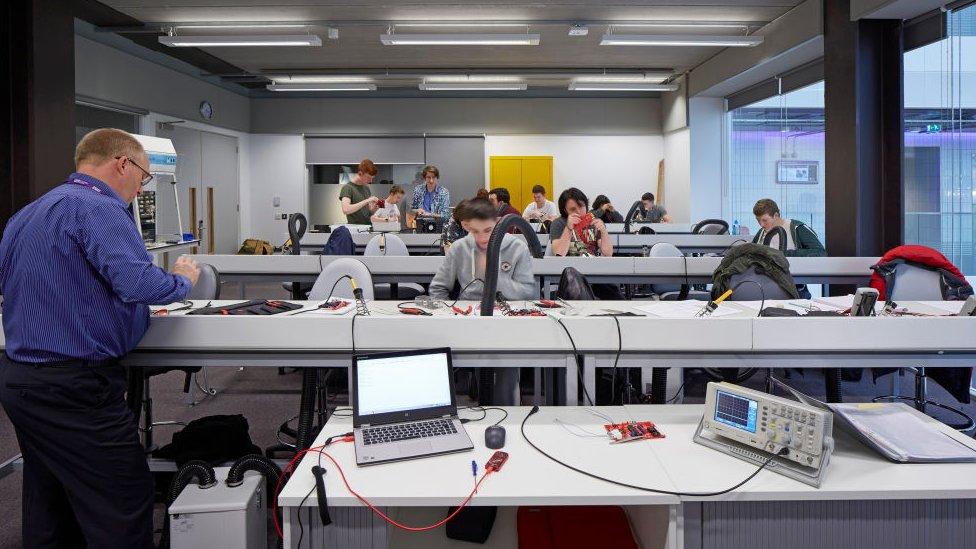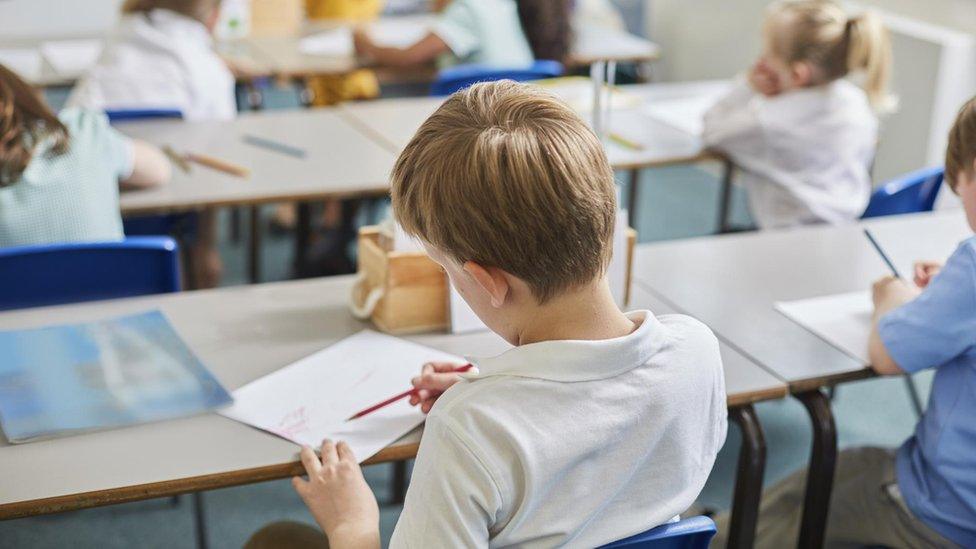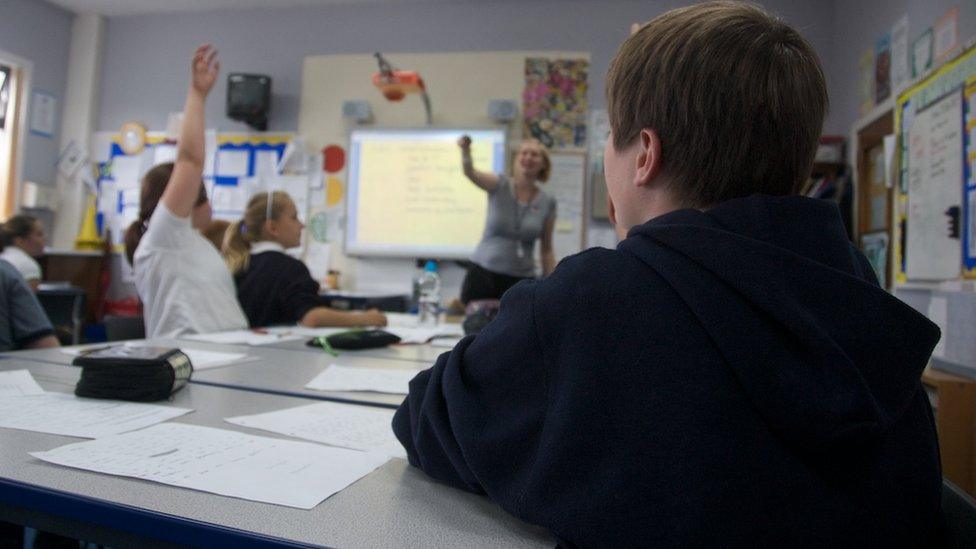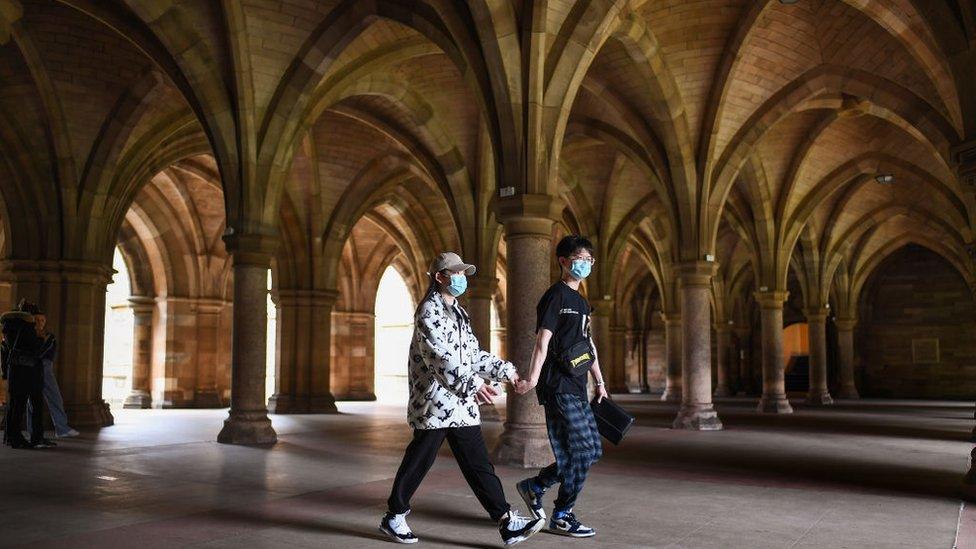Scotland's college drop-out rate rises during pandemic
- Published

The number of college students in Scotland leaving their studies saw an increase during the pandemic.
That was one finding in a Scottish government report, external into the harms that Covid-19 had on students and staff in higher and further education.
It also warned drop-out rates could rise further and this year's college enrolment was "considerably down".
College bosses said despite efforts to deliver learning remotely, "the level of disruption was unprecedented".
In March 2020 the nationwide lockdown resulted in an abrupt end to in-person learning for pupils and students.
College and university teaching was done remotely for the rest of the 2019-20 academic year and for much of 2020-21.
The report, which focused on the "indirect, wider harms of the pandemic", said that although the 2021-22 session has been closer to what it was pre-Covid there was still "an on-going cumulative wider impact on students and learners".
It looked at three areas including:
higher education,
further education,
and community learning and development in Scotland.
The report said that some of the wider harms "would not be unique to these sectors and are also likely to have affected other groups".
In its focus on colleges the paper said: "College and student representatives explained that the number of students dropping out of courses has increased. Further increases in drop-out rates remains a serious risk and new entrants who started in January 2022 are another at-risk cohort."
It went on to explain that the overall numbers of college enrolments were "considerably down in the current academic year" due to a number of factors.
More pupils had opted to stay on at school and more school pupils had secured university places. Added to that, there had been a greater availability of low skilled jobs and college course numbers had been capped as a result of physical distancing requirements.
The latest leaver destination survey, published in February 2022,, external indicated that the proportion of school leavers at either university or college had increased from 44.2% in 2019-20 to 45.1% in 2020-21.
However, the proportion of school leavers in further education fell from 28.1% to 23.3% and the proportion of school leavers who were unemployed fell from 6.0% to 4.2%.

Shona Struthers said students had worked "incredibly hard in some really difficult circumstances"
Shona Struthers, chief executive of Colleges Scotland, said students had worked "incredibly hard since disruption began in 2020 to achieve their qualifications, in some really difficult circumstances".
She added: "Colleges quickly developed innovative solutions to deliver learning, teaching and interaction remotely, and were able to maintain access to facilities for some practical courses, and for vulnerable students. However, the level of disruption was unprecedented.
"Learning how to learn at home and periods of isolation were real challenges for students, and college staff went above and beyond to engage and support learners. There's hundreds if not thousands of examples of this from all 26 colleges in Scotland where students were supported as individuals."
Ms Struthers highlighted mental health, digital poverty and real poverty as ongoing issues.
Impact to be felt for a decade
The director of Universities Scotland, Alastair Sim, echoed the college body's message that student education and welfare was central to decision making during the pandemic.
However, a lack of in-person learning had had an impact.
He added: "Our members were also clear from the start of the pandemic that Covid-19 was most likely to impact those from disadvantaged backgrounds, many of whom were trying to study in unsatisfactory home environments.
"However, the impact has been wider than that. 80% of students who replied to a recent survey felt that the pandemic has had a negative impact on their learning, and 74% had found it more difficult to stay focused and engaged.
"This harmful impact will be felt by universities not just with our current students but the pipeline of school pupils and college leavers who will want to come to university over the next decade."
President of NUS Scotland, Matt Crilly, said that life as a student could be "incredibly difficult".
He added: "We know there is good support out there, but even where support is available it can be hard for students to access."
Related topics
- Published14 December 2021

- Published23 November 2021

- Published15 June 2021
